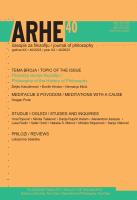Dance as a Heterotopia Against Hegemonic Discourses of Traumatic Experiences
Dance as a Heterotopia Against Hegemonic Discourses of Traumatic Experiences
Author(s): Darija Rupčić KelamSubject(s): Psychology, Aesthetics, Social Philosophy, Structuralism and Post-Structuralism
Published by: Филозофски факултет, Универзитет у Новом Саду
Keywords: Memories; trauma; body; dance; relief; counterhegemonic place; heterotopias;
Summary/Abstract: In this paper, we explore the dance as a practice and “Other” space, a counterhegemonic space which is affected by the existing social ordering, or existing power of traumatic discourse which is some kind of imposed discourse, while simultaneously resisting it. To explore these premises we will use Michel Foucault`s concept of heterotopia and apply it on the analysis of the dance as an artistic practice and possibilities to understand dance as a heterotopia in which dominant hegemonic discourses are reversed, and as a counterhegemonic space, as authors Christofidou and Milioni, emphases, that has a potential to disrupt and deconstruct hegemonic discourses of the past traumatic experiences or events. We argue that in order to be able to heal the traumas that are engraved in the body, and to understand the body as an expression and a canvas on which a crisis is outlined, we need bodily memories and stories, both those of survival, trauma and wounds, and those of healing. We demonstrate how dance may provide a counterhegemonic space, enable the reconstruction of the place of traumatic events, that are imprinted in body, into places of communication and reconstruction of the meaning, and how can dance invite individual to reflect on their identity and connect their fragmented self. Here we emphasize the meaning of movement – dance that opens the statics of the body to kinesthetic empathy, which in turn allows us to enter the spaces of unspoken body stories. The ethics of touch, proximity, and the ethics of the space between two bodies and what in these spaces "between" means to be, to be in that "not yet" (about-to-be) lead us in this direction. We assert that our bodies are both self-constituted as well as shaped by the collective, the society and history (personal or collective), and that we know by acting, primarily through the body, in synergy with the mind and the environment (enactive approach).
Journal: Arhe
- Issue Year: 2023
- Issue No: 40
- Page Range: 153-192
- Page Count: 40
- Language: English

